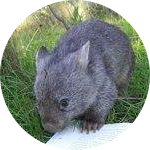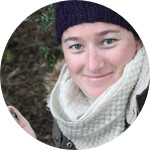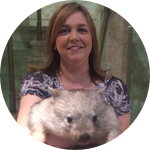Project Results
We compared the diet of bare-nosed wombats at several locations throughout NSW.
About This Project
Bare-nosed wombats are under threat from sarcoptic mange caused by the sarcoptic mange mite, Sarcoptes scabieii. Initially wombats suffer hair loss and become itchy, with the later stages of the disease leading to skin fissures, bacterial infections and ultimately death. Our study will identify how nutrition of free-ranging wombats is related to mange prevalence. By comparing the incidence and severity of sarcoptic mange, to the nutritional content of wombat dietary items and nutritional status.
Ask the Scientists
Join The DiscussionWhat is the context of this research?
Wombats are suffering from a horrendous disease caused by the sarcoptic mange mite, Sarcoptes scabieii. Initially wombats suffer hair loss and become itchy. However, the mites bury into their skin, it cracks open, and death occurs from bacterial infections (Skerratt et al. 2008). Whilst other animals suffer from sarcoptic mange, wombats are particularly vulnerable. We want to find out why!
Poor nutrition increases susceptibility to disease (Ullrey 1993) and causes lower reproductive output (Cook et al. 2001). Wombats experience nutritional stress due to living in a variable and challenging climate, with food that varies in availability and nutritional composition across seasons. Our study will explore how this nutritional availability is associated with sarcoptic mange in wombats.
What is the significance of this project?
By looking at nutrition in wombats with and without sarcoptic mange we can determine what the nutritional requirements of wombats are. Based on our findings we will be able to recommend supplementary food items to improve nutrition of those affected by sarcoptic mange and make recommendations for captive animals. Improving wombat nutrition will reduce immunological stress on wombats, and ultimately, minimise sarcoptic mange incidence. Understanding how wild wombats are nutritionally compromised will allow conservationists to enhance nutrition to support long-term survival and conserve this species.
What are the goals of the project?
We aim to improve the health of wild wombats and reducing sarcoptic mange by managing nutrition. We will use spotlighting to determine population numbers and identify individuals with sarcoptic mange in the population. We will collect scat samples from wild wombats over one year to analyse nutritional status of animals and relate it to the the intensity of sarcoptic mange infection.
Budget
Nutrient analysis of food items (grasses) and scats $100 per sample*30 samples = $3,000 (15 samples of each food and scats). To determine nutrient changes across seasons in the environment laboratory analysis of food items is required. These funds will cover the chemicals required to test samples for protein, lipid, carbohydrates, fiber and energy.
Funding is required for travel and accommodation at field sites (5 nights/sites x 4 seasons = 20 nights). We estimate $100/night x 20 nights = Total $2,000.
Endorsed by
 Project Timeline
Project Timeline
The study will occur over a one year period to allow collection of samples in Summer, Autumn, Winter and Spring at the five sites to account for differences in wombat diet in different habitats, climates, and rainfall areas. At completion of the project, a scientific publication will be submitted and recommendations for managing wombat nutrition will be disseminated to the wider community via conference presentations, and social media.
Aug 21, 2018
Project Launched
Oct 15, 2018
Travel to field sites to collect samples of food and scats season 1. Conduct spotlighting surveys
Jan 15, 2019
Travel to field sites to collect samples of food and scats season 2. Conduct spotlighting surveys
Apr 15, 2019
Travel to field sites to collect samples of food and scats season 3. Conduct spotlighting surveys
Jul 15, 2019
Travel to field sites to collect samples of food and scats season 4. Conduct spotlighting surveys
Meet the Team
Hayley Stannard
Dr Stannard is a nutritional ecologist that specializes in native Australian wildlife nutrition. She completed her PhD on optimizing nutrition and health in carnivorous marsupials. Dr Stannard’s research interests are focused on conservation biology and physiology of vertebrates, comprising of research focused on comparative physiology, welfare and biodiversity conservation. Her research has discovered new knowledge on the nutrition and welfare of iconic Australian wildlife (e.g. Tasmanian devils) as well as lesser know species (e.g. kultarrs).
Julie Old
Associate Professor Julie Old joined Western Sydney University in 2006. She has expertise in comparative and developmental immunology, native mammal biology, wildlife management, conservation, nutrition and citizen science. She completed her PhD in 2002 in marsupial immunology and worked as a Postdoctoral Research Fellow at Macquarie University prior to commencing her position at Western Sydney University. Julie’s research combines immunology, developmental biology, molecular biology, anatomy, nutrition, microscopy, ecological techniques and citizen science to solve important issues in wildlife health and disease, especially marsupials. Julie is also the Chief Investigator of the Citizen Science project, WomSAT.
Since 1998, her research has resulted in over 80 research publications in high impact journals including PLoS One and DCI. She is also Academic Course Advisor for Bachelor of Natural Science (Animal Science, Environmental Management and Environment and Health) in the School of Science and Health at Western Sydney University. She is the Unit Coordinator for Animal Science and Animal Health and Welfare. She also teaches into several other units inthe Natural Science and Science programs. She is currently supervising two PhD and five Masters students. She is a regular reviewer of national and international journals, research grants and PhD theses.
Project Backers
- 20Backers
- 103%Funded
- $5,161Total Donations
- $266.37Average Donation


